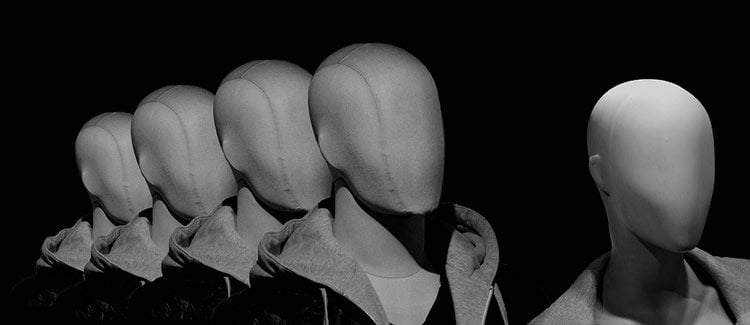Summary: The force by which a person embarks upon a utilitarian act may be predicted by psychopathic traits, a new study reports.
Source: University of Plymouth.
New research shows people would sacrifice one life to save others – and people with psychopathic traits would carry out the actions with greater force.
New research shows that people would sacrifice one person to save a larger group of people – and in addition, the force with which they carry out these actions could be predicted by psychopathic traits.
The study, led by the University of Plymouth, compared what people ‘said’ they would do with what they actually ‘did’ by comparing a questionnaire with actions in immersive moral dilemmas created using virtual-haptic technologies (i.e. using a robotic device which measures force, resistance, and speed, whilst simulating the action of harming a human).
In several dilemmas, participants had to decide whether to sacrifice a person by performing a harmful action against them, in order to save a larger group of people.
While all individuals were more likely to sacrifice others in these immersive environments than in questionnaire-based assessments, people with strong psychopathic traits were more likely to generate these harmful actions with greater physical power.
Psychopathy is generally characterised by antisocial behaviour and impaired empathy. As such, it is thought that individuals with strong psychopathic traits find it less emotionally challenging to sanction utilitarian actions.
In the present research, this resilience to performing actively harmful acts appears to enable these individuals to act for the ‘greater good’ (i.e. to save the many). This result therefore indicates that, in certain circumstances, psychopathic traits could be considered beneficial, since they can lead to a more vigorous response.
This study is a result of an interdisciplinary collaboration between Dr Kathryn Francis, Dr Sylvia Terbeck, Raluca Briazu, Dr Michaela Gummerum, and Dr Giorgio Ganis in the University’s School of Psychology, Agi Haines, a designer based in the University’s Transtechnology research group, and Dr Ian Howard of the Centre for Robotics and Neural Systems.

Dr Francis, now a Postdoctoral Research Fellow in Philosophy and Psychology at the University of Reading, said:
“This research highlights our proneness to moral inconsistency; what we say and what we do can be very different. For the first time, we demonstrate how personality traits can influence the physical power of our moral actions. Importantly, the multidisciplinary approaches that we have used here, combining virtual reality, robotics, and interactive sculpture, places further emphasis on the need to unite the sciences and the arts when investigating complex phenomena such as morality.”
Dr Sylvia Terbeck, Lecturer in Social Psychology and study co-author, added:
“This study opens up the possibility to assess psychopathy using novel virtual reality technology – which is vital to better understand how and why people with these behavioural traits act in certain ways.”
Dr Ian Howard, Associate Professor in the Centre for Robotics and Neural Systems, said:
“This work shows how techniques developed to study human movement can play a value role in psychological assessment and thereby lead to new insights into human social behaviour.”
Funding: The full study, which was supported by CogNovo.
Source: Martin Herrema – University of Plymouth
Publisher: Organized by NeuroscienceNews.com.
Image Source: NeuroscienceNews.com image is in the public domain.
Original Research: Full open access research for “Simulating Moral Actions: An Investigation of Personal Force in Virtual Moral Dilemmas” by K. B. Francis, S. Terbeck, R. A. Briazu, A. Haines, M. Gummerum, G. Ganis & I. S. Howard in Scientific Reports. Published online October 24 2017 doi:10.1038/s41598-017-13909-9
[cbtabs][cbtab title=”MLA”]University of Plymouth “Sacrificing One Life to Save Others: Psychopaths’ Force for ‘Greater Good’.” NeuroscienceNews. NeuroscienceNews, 25 October 2017.
<https://neurosciencenews.com/psychopath-utilitarianism-force-7810/>.[/cbtab][cbtab title=”APA”]University of Plymouth (2017, October 25). Sacrificing One Life to Save Others: Psychopaths’ Force for ‘Greater Good’. NeuroscienceNews. Retrieved October 25, 2017 from https://neurosciencenews.com/psychopath-utilitarianism-force-7810/[/cbtab][cbtab title=”Chicago”]University of Plymouth “Sacrificing One Life to Save Others: Psychopaths’ Force for ‘Greater Good’.” https://neurosciencenews.com/psychopath-utilitarianism-force-7810/ (accessed October 25, 2017).[/cbtab][/cbtabs]
Abstract
Simulating Moral Actions: An Investigation of Personal Force in Virtual Moral Dilemmas
Advances in Virtual Reality (VR) technologies allow the investigation of simulated moral actions in visually immersive environments. Using a robotic manipulandum and an interactive sculpture, we now also incorporate realistic haptic feedback into virtual moral simulations. In two experiments, we found that participants responded with greater utilitarian actions in virtual and haptic environments when compared to traditional questionnaire assessments of moral judgments. In experiment one, when incorporating a robotic manipulandum, we found that the physical power of simulated utilitarian responses (calculated as the product of force and speed) was predicted by individual levels of psychopathy. In experiment two, which integrated an interactive and life-like sculpture of a human into a VR simulation, greater utilitarian actions continued to be observed. Together, these results support a disparity between simulated moral action and moral judgment. Overall this research combines state-of-the-art virtual reality, robotic movement simulations, and realistic human sculptures, to enhance moral paradigms that are often contextually impoverished. As such, this combination provides a better assessment of simulated moral action, and illustrates the embodied nature of morally-relevant actions.
“Simulating Moral Actions: An Investigation of Personal Force in Virtual Moral Dilemmas” by K. B. Francis, S. Terbeck, R. A. Briazu, A. Haines, M. Gummerum, G. Ganis & I. S. Howard in Scientific Reports. Published online October 24 2017 doi:10.1038/s41598-017-13909-9






